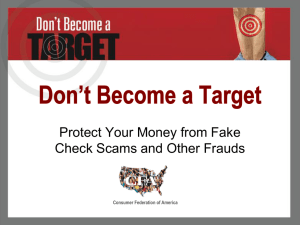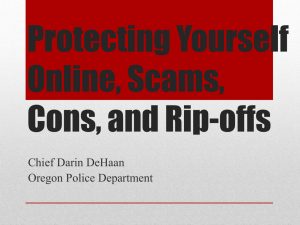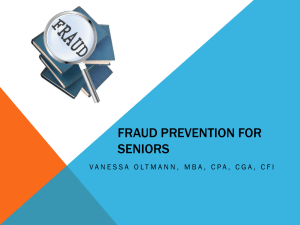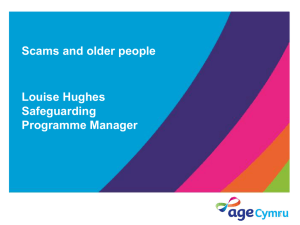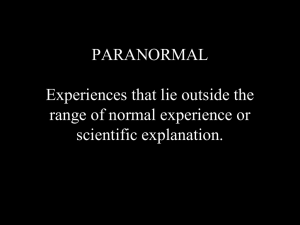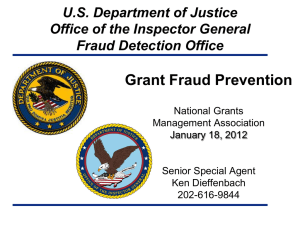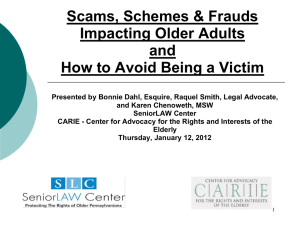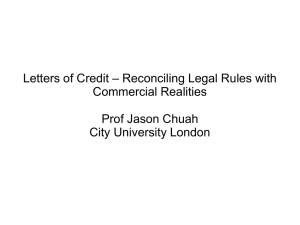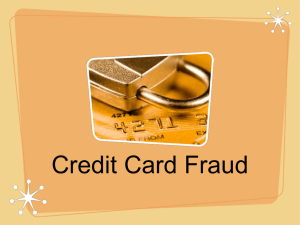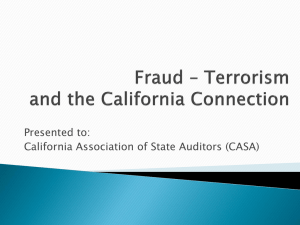Cons and Scams
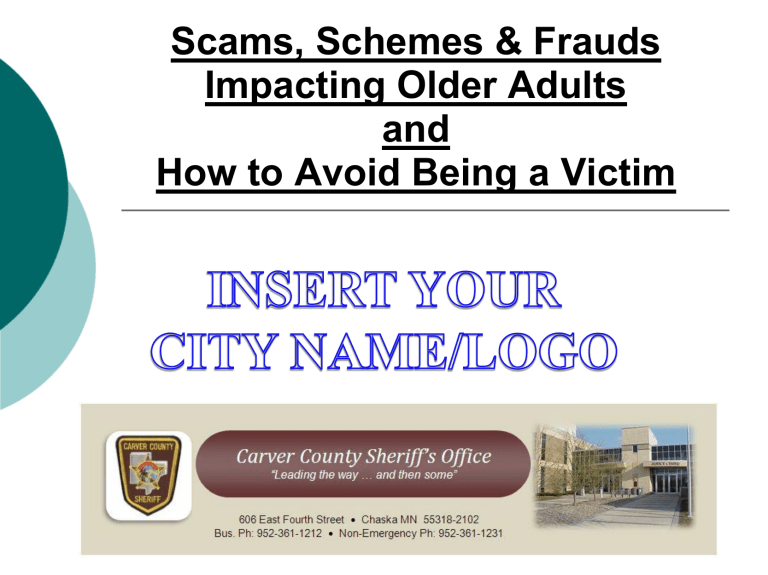
Scams, Schemes & Frauds
Impacting Older Adults and
How to Avoid Being a Victim
1
Scams, Schemes and Frauds
Facts
• Financial fraud is one of the most common yet under-reported forms of elder abuse
• Financial scams targeting seniors have become so prevalent that they are now considered the crime of the 21st century
• Elder financial fraud victims lose an estimated 2.9 billion dollars annually [2011 Met life study]
• As the population of senior citizens increases, so does the number of people willing to take advantage of them
2
Top Ten Scams, Schemes, and
Frauds
• Home Improvement Fraud
• Debt Relief Fraud
• Funeral Fraud
• Reverse Mortgage Scams
• Investment Scams
• Telemarketing Fraud
• Internet Fraud
• Lottery and Sweepstakes Fraud
• Phony “Government” Scams
• Grandparent Scam
3
Home Improvement Fraud
Be wary of the contractor who:
• Solicits door to door
• Just happens to have materials left over from a previous job
• Only accepts cash payments
• Asks you to get the required building permits
• Does not list a business number in the local telephone directory
• Uses high pressure sales tactics
• Fails to provide a written contract
• Requests full payment before completing work
• Offers exceptionally long guarantees
• Offers home improvement loans
4
Home Improvement Fraud
Tips for Avoiding Home Improvement Scams
• Obtain more than one bid for the job
• Insist that the contract be in writing
• Don’t pay contractor before you read and sign a contract
• Don’t pay contractor more than 1/3 of the contract price to begin work
• Sign contract before the work begins and keep a copy for your records
• Contract must state the exact work to be done and include start and completion dates along with the total cost of the project
• Obtain the name, address (not P.O.Box) and phone number of contractor on contract.
• Get license number and name license is under on the contract
• Check to see if contractor registered with Minnesota Attorneys General office.
• Check for complaints with the Better Business Bureau
• Never make final payment until you are completely satisfied with the work
5
Debt Relief Fraud
Bogus Credit Counseling Services and Debt Management Plans (DMP)
• Lie about their nonprofit status
• Don't provide education and counseling
• Often arrange for consumers to pay debt through a DMP
• Many have been shut down by the FTC
How A DMP Works:
• Deposit money each month with the credit counseling service, which uses your deposits to pay your unsecured debts
• Counselor develops payment schedule with creditors
• Creditor may agree to low interest rates and waive certain fees
• DMP requires the counseling service to make regular timely payments
• May take up to 48 months to complete
• Must agree not to apply for or use any additional credit while in the plan
6
Debt Relief Fraud
Tips for Avoiding Debt Management Plan Fraud
Be wary of credit counseling organizations that:
• Charge high up-front fees for enrolling in credit counseling or a DMP
• Pressure you to make “voluntary contribution,” another name for fees
• Try to enroll you in a DMP without spending time reviewing your financial situation
• Offer to enroll you in a DMP without teaching you budgeting and money management skills
• Demand that you make payments into a DMP before your creditors have accepted you into the program
7
Funeral Fraud
•Overcharging for goods and services
•Selling unnecessary services and goods
•Stealing or mismanaging funeral prepayment funds
8
Homeowner/Reverse Mortgage
Scams
What is a Reverse Mortgage?
• Home loan that lets a homeowner convert the equity in his/her home into cash
• The loan is repaid when you die, sell your home, or when home is no longer primary residence
• Many have no income qualifications
• One owner Must be 62 or older
• Cash can supplement income, pay taxes, insurance, home repairs
• Retain title to home
9
Homeowner/Reverse Mortgage Scams
Scam 1: Charged for Information
• Beware of companies who call themselves advisors or estate planners, and offer nothing more than information
• Say they will help you find a reverse mortgage lender and provide you with basic information about the loans for a fee
• HUD provides the same facts and services for free
• Do not pay for any type of Reverse Mortgage Information, brochures, or calculations of what you can qualify for
• Senior home owners who have fallen prey to this scam have lost thousands of dollars
• Contact HUD for information on reverse mortgages at 1-888-466-
3487 or go to HUD.gov
10
Homeowner/Reverse Mortgage Scams
Scam 2: Shady Counseling
• Beware of counselors that are partners with other reverse mortgage lenders or financial service individuals and will try to push you into their products or services
To Avoid the Shady Counselor:
• Meet with a HUD approved Reverse Mortgage Counselor
• FHA Housing Counseling Agency Listing at 1-800-569-4287 or
HUD.gov
11
Homeowner/Reverse Mortgage Scams
Scam 3: Equity Theft
• Scheme designed to withdraw false and inflated equity from residential properties
• Scammer purchases the residential property using a "straw buyer"
• The scammer then recruits a senior to "purchase" the property from the straw buyer by transferring the deed to the senior with no exchange of money.
• After the senior has occupied the property for 60 days, the scammer arranges for the senior to obtain a reverse mortgage
• With the aid of a fraudulently inflated property appraisal - senior is encouraged to request a lump sum from the lender
• Often with the help of the settlement attorney, the scammer absconds with all of the equity money at closing.
• How the Senior Loses:
• Senior gets no equity money at closing
• Senior is an unwitting accomplice to lender fraud
• Senior is put into a home and cannot afford to pay for the maintenance, taxes and insurance.
• If approached about using a reverse mortgage on a rehab or foreclosure property and asked to sign a Quit Claim Deed up front - this is a fraud.
12
Homeowner/Reverse Mortgage Scams
Scam 4: Mortgage Repair Scams
• Due to strict FHA Appraisal requirements, a reverse mortgage may require repairs made to the property before closing
How to Protect Yourself:
•
Find out from the appraiser exactly what needs to be repaired
• Get multiple quotes - don't just use contractor recommended by the Reverse Mortgage company
• Reputable contractors will agree to be paid at closing
• Work needs to be up to HUD guidelines
13
Investment Schemes
Types of Investment Schemes
• Investments for working capital
• Oil-rich land, film production company, brokers of gemstones, communication businesses, ownership interests in company
• Investment Questions:
• If the answer to any of these questions is no, vague or complicated = fraud
• Is company registered to sell securities? (Obtain annual report from SEC)
• Is it "too late" if I don't invest my money now or “can I wait to think it over?”
(Pressure tactic)
• Does investment have a track record? (Get track record and background of people promoting it)
• Where is my money going?(Ask for written proof of where money is going and investors) 14
Investment Schemes
Investigate
• Get an independent appraisal of the specific asset, business or venture
• Search for published information about the company, particularly proof that the company has registered the securities it is selling (SEC)
• Check with someone you trust who has heard of the company
• Check with BBB, FTC and AG for any complaints
• Don't let appearances fool you - anyone can incorporate an entity and put a toll-free number into their home
• Beware of sales pitches that play down risk or portray written risk disclosures as routine formalities required by the government
• Scam artists lie
• Demand written proof of profit projections from independent sources
• If the investment sounds too good to be true, it usually is
15
Investment Schemes (cont.)
The Seminar Pitch
• Earn up to $100,000 a year
• Multiply your money in 6 months or less
• Insider secrets for making money fast
• You can't afford to pass up this valuable opportunity
• Letter, infomercial
16
Investment Schemes
Be Wary of Promotional Materials or Sales Pitches that Make these claims
• Earn big money fast, regardless of your lack of experience or training
• Offered for a short time only
• "Sure thing"
• Reap financial rewards by working part time at home
• You will be coached each step of the way to success
• The program worked for other participants - even the organizers
17
Investment Schemes
How to Avoid the Seminar Pitch
• Avoid high pressure sales pitches that require you to buy now
• Investigate the business
• Be wary of "success stories" - generally paid shills
• Be cautious of seminar representatives who are reluctant to answer questions, or who give evasive answers
• Ask how much money you need to qualify for the investment or sales opportunity - get it in writing - ask about the company's refund policy
18
Telemarketing Fraud
• Scam artists use the telephone to prey on older people’s vulnerability
• High pressure tactics- you must act NOW or offer will be no good
• Can’t afford to miss this “no risk” offer
• One of the most common schemes -no face to face interaction- no paper trail
• Once deal has been made, victim’s name is shared with other scam artists looking for easy targets
19
Telemarketing Fraud
• Scam artists may use any of the following tactics:
• Cold Calls- scam artists get victims' name from telephone directory , mailing list or "sucker list" (information about people who've responded to previous telemarketing scams)
• Direct mail- Letter or postcard saying you've won a prize and please call this # for more info.
• Can begin with a letter, postcard, TV, newspaper or magazine ad directing victims to call for more information.
•Text messages-Use of cellular telephones and locked into a fee for use without even understanding it.
20
Internet Fraud
• “
Cyberspace”- newest area being used by con artists
• Effective means of reaching a mass audience without spending a lot of time, money or effort
Websites, online message, or “spam” e-mails
• used for the purpose of fraudulent solicitations to prospective victims
• Easy to make messages look real and credible
21
Examples of Internet Fraud
• Internet auction fraud is a misrepresentation of a product advertised for sale through an Internet auction site
• Free credit report fraud
• Get rich quick schemes-make money in your spare time
• Work at home scams and business opportunities
• Advertising that promises much more than can be delivered (Dramatic Weight Loss in 2 weeks)
• ‘Phishing,” con artists attempt to gather personal information by asking consumers to “update” or
“verify” billing information, such as credit card information and Social Security numbers
22
How To Avoid Internet Fraud
• Avoid filling out forms in emails or on websites that ask for personal information
• Only open attachments from known senders
• Do not click on links in unsolicited emails
• Contact businesses that supposedly sent the email to verify
• Look for the small yellow lock icon that appears in the browser window
• Do not click on Internet “pop ups”
23
More Tips to Avoid Internet Fraud
• Don’t respond to unsolicited e-mails
• Make certain you have a firewall and up to date anti-virus software
• Don’t use the same password for all online accounts
• Don’t do online banking or access Internet accounts using unsecured wireless networks
24
Lottery and Sweepstakes Fraud
• Fraudulent foreign scam artists telephone or send mail to people in the U.S. telling them they’ve won a sweepstakes or foreign lottery
• Victim is told he or she must first pay “fees” for shipping, handling, taxes, customs or other supposed expenses by wiring money, sending a personal check, providing credit card information or sending a money order by overnight delivery or courier
25
Phony Government Scams
• Letters, notices or emails misrepresenting government agencies such as the Social Security, Medicare, FBI,
Department of Labor and IRS
• Appear legitimate because they contain phony government seals, symbols and/or names
• Callers, who claim to be associated with the United States
Government, tell you that you have been awarded a substantial government grant BUT must first pay a processing fee
• Method to intimidate victim into providing personal information
26
Grandparent Scam
• Scam artists contact unsuspecting grandparent by phone
• Scam artists may pose as a law enforcement agent medical personnel or as the "grandchild"
• Tell grandparent that there has been an arrest or injury, or some other emergency situation (often outside of the
U.S.) and provide specific details
• Most caring grandparents are extremely alarmed and willing to do what they can to help their grandchildren get out of trouble
27
Nigerian Bank Scam
• If you send us money or information, we will send you more money.
•
There are many variants of the letters sent. One of these, sent via postal mail, was addressed to a woman’s husband and inquired about his health. It then asked what to do with profits from a $24.6 million investment, and ended with a telephone number. Other official-looking letters were sent from a writer who said he was a director of the stateowned Nigerian National Petroleum Corporation. He said he wanted to transfer $20 million to the recipient’s bank account – money that was budgeted but never spent. In exchange for transferring the funds out of Nigeria, the recipient would keep 30% of the total. To get the process started, the scammer asked for a few sheets of the company’s letterhead, bank account numbers, and other personal information. Yet other variants have involved mention of a wealthy Nigerian seeking to transfer large sums of money out of the country.
28
Do you have any questions or discussions?
29
INSERT YOUR LOGO
30
